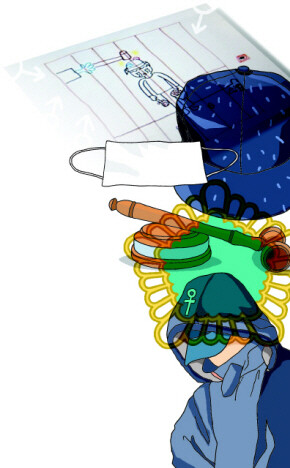hankyoreh
Links to other country sites 다른 나라 사이트 링크
Debate over drinking and reduced sentencing in child rape case continues

A debate is raging over the sentence Mr. Jo, a 57-year-old man and the defendant in the “Na-young (a pseudonym) Rape Case,” who has been given a 12 year sentence. The general public is asking for both a stronger sentence and stronger systemic measures. Mr. Jo has been sentenced to 12 years in jail, and will be required to wear an electronic ankle bracelet for a period of seven years after his release. The longest possible sentence for rape and injury is life in prison. The South Korea Supreme Court ruled on the Na-young Rape Case on Sept. 24.
The case refers to the rape of an 8-year-old girl, being referred to as “Na-young,” on her way to school last December. The rapist, Jo, dragged “Na-young” into the bathroom of a nearby church, strangled her until she was unconscious and then raped her. The girl was seriously injured when, in an attempt to destroy evidence, Jo permanently damaged some of her organs. The girl has been receiving hospital treatment.
The major point of contention in the debate regarding Mr. Jo’s sentencing has been over the acknowledgment by the court of his “weak state of mind and body.” The Ansan branch of the Suwon District Court had initially decided on a life sentence for Mr. Jo, but then reduced the sentence down to 12 years because Jo was drunk when he committed the crime. Jo appealed the decision, claiming the sentence was too harsh, and the Supreme court upheld the initial ruling.
Article 10 of the South Korean Criminal Code states that a sentence can be reduced for an individual whose capacity to recognize the consequences of his actions or whose ability to determine his basic intent has been weakened due to an impairment of body or mind. The court said individuals who commit crimes after losing control due to psychological diseases, feeble-mindedness, abnormal psychological states and mental impairment due to addiction to alcohol and drugs are protected under Article 10 and granted Jo a lesser sentence. During his trial, it was determined that Mr. Jo is an alcoholic who lost control of his actions during the time of the crime.
Public sentiment around this case seems to find the application of Article 10 to those who commit heinous crimes, including Mr. Jo, problematic, and are saying acknowledging a temporarily impaired state of mind for defendants who commit impulsive acts of assault or theft or criminal negligence is not applicable in this case. Moreover, legal analysts point out that Jo severely injured the girl while trying to destroy evidence. This is odd behavior for someone whose capacity to recognize the consequences of his actions was judged to have been lost.
Since the current trial system leaves it up to court judges to decide whether a defendant was in a weak state of mind or body, it is difficult to exclude the possibility of arbitrary or subjective decisions. Lee Sang-won of the Korean Institute of Criminology (KIC) explained the difficulty of coming to a right decision, and said that in the criminology world, there has been a long debate on the question of responsibility for crimes committed in a state of drunkenness, such as in the Na-young Rape Case.
There are also those who believe that since it is difficult for court judges to have expert knowledge of biology, they should leave such decisions to psychiatrists or the so-called “white coat judges.” Sin Yang-gyun, a professor of criminal justice at Chonbuk National University, said that since court judges are given broad judgment over matters, including biology, there is room for subjective judgments to interfere.
There are those within some quarters of the criminology world who are pointing out the need for separate laws to deal with crimes committed while in an impaired states of mind due to heavy drinking.
Please direct questions or comments to [englishhani@hani.co.kr]
Editorial・opinion
![[Column] Park Geun-hye déjà vu in Yoon Suk-yeol [Column] Park Geun-hye déjà vu in Yoon Suk-yeol](https://flexible.img.hani.co.kr/flexible/normal/500/300/imgdb/original/2024/0424/651713945113788.jpg) [Column] Park Geun-hye déjà vu in Yoon Suk-yeol
[Column] Park Geun-hye déjà vu in Yoon Suk-yeol![[Editorial] New weight of N. Korea’s nuclear threats makes dialogue all the more urgent [Editorial] New weight of N. Korea’s nuclear threats makes dialogue all the more urgent](https://flexible.img.hani.co.kr/flexible/normal/500/300/imgdb/original/2024/0424/7317139454662664.jpg) [Editorial] New weight of N. Korea’s nuclear threats makes dialogue all the more urgent
[Editorial] New weight of N. Korea’s nuclear threats makes dialogue all the more urgent- [Guest essay] The real reason Korea’s new right wants to dub Rhee a founding father
- [Column] ‘Choson’: Is it time we start referring to N. Korea in its own terms?
- [Editorial] Japan’s rewriting of history with Korea has gone too far
- [Column] The president’s questionable capacity for dialogue
- [Column] Are chaebol firms just pizza pies for families to divvy up as they please?
- [Column] Has Korea, too, crossed the Rubicon on China?
- [Correspondent’s column] In Japan’s alliance with US, echoes of its past alliances with UK
- [Editorial] Does Yoon think the Korean public is wrong?
Most viewed articles
- 1[Column] Park Geun-hye déjà vu in Yoon Suk-yeol
- 2Will NewJeans end up collateral damage in internal feud at K-pop juggernaut Hybe?
- 3N. Korean hackers breached 10 defense contractors in South for months, police say
- 4Why Korea shouldn’t welcome Japan’s newly beefed up defense cooperation with US
- 5[Guest essay] The real reason Korea’s new right wants to dub Rhee a founding father
- 6Thursday to mark start of resignations by senior doctors amid standoff with government
- 7[Editorial] New weight of N. Korea’s nuclear threats makes dialogue all the more urgent
- 8The dream K-drama boyfriend stealing hearts and screens in Japan
- 9Kim Jong-un expressed ‘satisfaction’ with nuclear counterstrike drill directed at South
- 10Terry Anderson, AP reporter who informed world of massacre in Gwangju, dies at 76